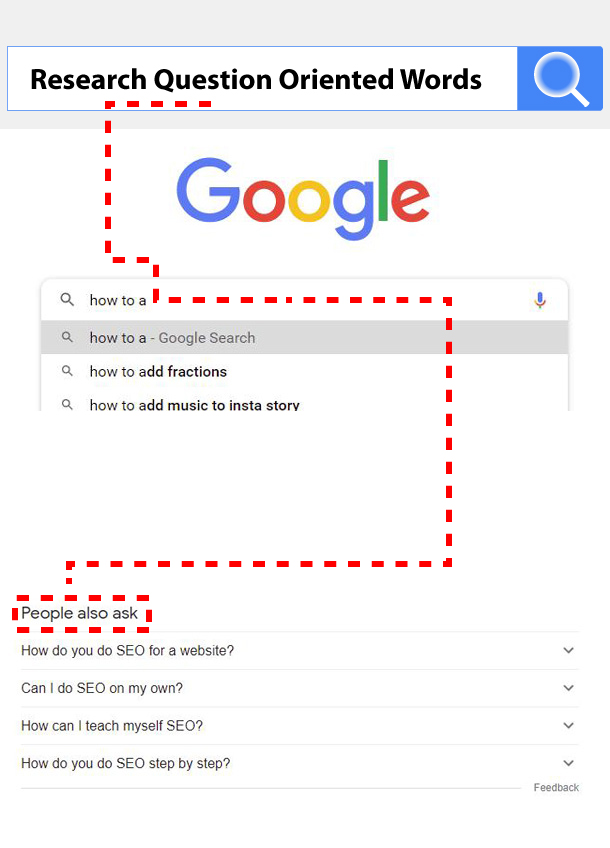Keyword research is the heart of any website that can be classified as successful. Whether you are conducting keyword research for SEO, or, whether you need to find keywords for your Google Ads Pay Per Click PPC advertising campaigns “thorough keyword research is needed”.
Definition of a Keyword
When you think of keywords, just think of them as spoken words written by people when searching for anything they want answers for.
Definition of Keyword Targeting
Targeting keywords is nothing more than selecting a single word or multiple words which you identify as “words that will be used by people when searching for products and services on internet”. But critically, for your website’s success, keyword targeting is nothing more than answering questions.
Must Know Facts About Keywords
Best way to master keyword research and targeting is by knowing the fact that, before your ideal customers use their digital devices to search for the products and services featured on your website. Something very important happens “a need arises”
And to fulfill that need, your customers ask “questions” to search engines by typing words. It is that you research & target as opposed to selecting few keywords per se.
Because you probably already know which industry specific keywords you would like to be #1 in Google for. But when researching keywords thoroughly using RankYa insights, you’ll be able to precisely target and rank your industry specific keywords all while increasing your conversions, because you understood what keyword targeting is. See above underlined.
The Only Keyword Discovery Tools You’ll Ever Need
- Google Keyword Planner Tool
- Experimenting with Google Search Box
- Google’s Related Search Feature, and or, People Also Asked Feature
- Your Competitor Website or Ads can also be useful
- Google’s define: feature
Related Search & People Also Asked Feature

Google shows these according to the data it has for a given Search Query. That means, its a gold mine for creating blog posts.
Also, by analyzing related search results, you can begin to understand the association between certain search terms and your target keywords accordingly.
Google Keyword Planner Tool
If there is one tool you and I must use, then its the Google Keyword Planner Tool because the data comes from the most popular search engine on planet earth.
Google Search Box
Another great way to see which search terms are searched by others. Particularly for finding long tailed keywords with precise question oriented intent. Words such as “how to, where is, what does, how do I” so on and so forth.
Targeting 3, 4 or even 5 words can allow you to build an authoritative website. Because longer queries are searched often than you think, and yet, most website owners do not want to target them thinking that the amount of website traffic isn’t worth it. But nothing could be further from the truth, because long tailed keywords are indeed searched more than you think!
Target these types of words that have question oriented intent. Also, you can use long tailed keyword targeted blog posts for increasing your internal link count as well. This will boost the rankings for your other important web pages.
Analyze Competitor’s Website for Key Words
Often times, other websites that are directly competing with yours use meta keywords tag revealing which keywords they are targeting. To see the meta keywords tag, Press CTRL+U on your keyboard (if you’re using Chrome) (if you’re using Internet Explorer Press right click and select “view source”) and look for: < meta name="keywords" content="keyword tags" >
Use Google as a Dictionary
How can we ever rank a keyword without first understanding what it actually means to Google? Surely, you already believe that you know the services/products words mean what you think they mean, but does it really? If so, what else could they mean?
You can use Google as a dictionary by placing define before a keyword. Looking at similar words as well as find synonyms and variations (including past, present tense, etc.) of the keywords you’ll be optimizing your landing pages for.
Understand that Google is a multilingual global search engine with Natural Language Processing ability, that means, Google analyzes composition of clauses, phrases, as well as the word’s grammatical features
Here are some additional tools RankYa uses for my valued clients SEO and website optimization projects which you may also find useful
Spoken Language and Symbols
In human language, there are symbols that we all agree to use to communicate concepts for an abstract term within our minds. These symbols we call letters in English are different to different people using another language than ours.
Google being a global multilingual search engine, its critical to know this, Google must (and does) heavily rely on text it finds and indexes on internet. It begins analyzing the textual content on your website starting from a single letter, then, root words, then others. To prove this, you can conduct a search for Letter ‘A’ to see what Google search suggests.
To provide its users with better user experience, it suggests keywords based on person’s online browsing patterns and Google activity as well as what other keywords people are searching Google with. Basically, there is a reason Google shows these search predictions and its not just random.
When you combine all this new found knowledge you now possess, use your findings when you begin your website optimization.
Anticipation is the Key for Finding Keywords
Now that I have shown you how you can conduct keyword research in today’s Google Page Experience world, let me also suggest the most important keyword research tactic I saved for last. Anticipate in advance for keyword search patterns that are likely to be searched. For example:
Let us imagine that you found out that people searched for “Your Industry Specific Search Terms” + “YEAR” for example: 2022. Then around December or January you can publish content before anyone else and get first position ranking quickly because you have anticipated these searches before they even occurred
You can find similar search patterns regardless of the industry your business website is in. It can be anything “News, latest industry updates or changes, new products, trends” or others suitable specific to your business.
Many other business website owners and also SEO experts following RankYa use these techniques with great outcomes. Because that’s what keyword targeting mastery is all about, anticipation.
Never shy away from the importance of long tailed keyword selection and targeting. You may not get huge amount of website traffic ranking long tailed keywords, nonetheless they are critical for ranking highly competitive keywords as detailed on the latest Course by RankYa. You may also download and keep this PDF document related to keywords

“Practical” but very powerful way of doing keyword research. However, if I may add, these tools are helpful too if you want to research on long tail keywords.
Hi Rankya,
It is a super tactics for finding keyword research. I think it would be not helpful but 100% effective for keyword research. I always learn new things from you. Education is the backbone of a human when it is interesting, learn new innovative things, then we can get real interest from education and that is Tutor.
Thank you very much.
Rakibul
Thank you Rakibul, you and I have much in common then because I love learning new things always and really appreciate those who share their knowledge without meanness or selfishness. So I am glad that you are enjoying learning from RankYa SEO blog, I’ve created two basic courses (1 about how to use Google Webmaster Tools for SEO in 2016 (quick overview) and the other ‘Google Analytics tutorials 2016’) these posts are scheduled to be published soon. I would really appreciate your thoughts about them, and any feedback for improving our blog. Till then, thank you once again for your feedback
very helpful for newbies great article @ RankYa
Hello Venkatesh, great to hear that you benefited from learning ways to conduct Keyword Research in 2016 I created a new video tutorial and will update this post today. Looking forward to your other comments